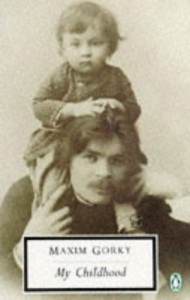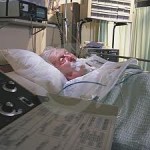 “Many years later I understood that because of the privations and the poverty of their lives, Russians in general liked to entertain themselves with misery: they played with it like children, and they were rarely ashamed to be wretched.” That’s from Maksim Gorky’s Childhood, that has just come out in a new translation. This is from the end of Chapter X. He goes on:
“Many years later I understood that because of the privations and the poverty of their lives, Russians in general liked to entertain themselves with misery: they played with it like children, and they were rarely ashamed to be wretched.” That’s from Maksim Gorky’s Childhood, that has just come out in a new translation. This is from the end of Chapter X. He goes on:
“In the endless tedium of daily life, grief becomes a holiday; a fire’s an entertaining show. On a blank face, even a scratch is a beauty mark.”
Gorky’s childhood was full of yelling, abandonment, drunkenness, beatings and more beatings, and all manner of deprivation. I was reading this last week when Jerry was in the University of Michigan Hospital—(so was I, since I was staying at the hotel inside the hospital). I was walking down corridors, looking in rooms where people lay alone or with an occasional visitor, and hooked up like Medusa to a tangle of tubes. Others sitting up in bed, surrounded by family, all watching TV and laughing together as if they were having a regular night. All varieties.
Then I started a new biography of Mozart and made note of these words: “Mozart avoided the noisy and empty fireworks that spoil so many of the violin works of the period. He thought them silly. He said he was ‘no great lover of difficulties for their own sake.’”
I was thinking of how we respond to both our own pain and that of others. Sometimes it seems we’re in love with difficulty for its own sake. Makes a good story afterward. The large scar, the almost-dying, the awful pain. But that’s when things turn out well. No one falls in love with serious, terrible difficulty.
I have no inclination to talk about last year’s chemo and radiation. I’d just as soon leave it in the past.But each week when I think what to write here, and every time I start a new poem, I’m on the lookout for the glitch, the place where there’s not smooth sailing, where there’s something to work with. Tension. You should see the line of staples down Jerry’s back! But hooray, it looks as if he’s going to be a lot better, the nerves having much more room to breathe. Rising action, climax, denouement. 
I’m willing to suspend a good ending, if the details are so intriguing that I’m caught in them, living the uncertainty. I’m willing to lose myself in a character, to see deep into the life, into its inherent ambiguities. But even then I notice there’s always some sort of tension and release, and I suspect that’s because existence itself breathes in and breathes out. Creation and destruction are not exactly twin poles; they’re simultaneous actions. When the breath sucks in, the abdomen and lungs expand. When the breath goes out, the ribs and abdomen pull inward. 
I wrote my dissertation a million years ago on the American man of letters, William Dean Howells. I traced patterns of imagery (yes,that long ago!) in four of his best-known novels. I was interested in how a consummate realist uses images. Do they remain realistic? When do they lift off and become metaphor? I found that Howells’ images alternated in an almost regular pattern from the concrete to the metaphorical/symbolic. (If you want further explanation, I’m likely to lend you my dissertation, so don’t ask!).
In Neurosurgery A corridor where Jerry was, there was in one room a bald woman who just lay there, no visitors that I ever saw. She didn’t appear to move all day. I looked in as I passed one evening and saw the nurse feeding her. I will never forget the expression on the nurse’s face. She didn’t know anyone was watching. Her face was so full of compassion and tenderness. She could have stuffed food in the woman’s mouth and daydreamed at the same time, or stared out the window. But she was giving that woman all the love she could in that moment. An absolutely bedrock realistic scene that for me lifted off into a wordless beauty.
That is difficulty and what it can draw forth. That is drama and passion. That is poetry and religion. That draws forth all the words in the world and stops all words in their tracks.
